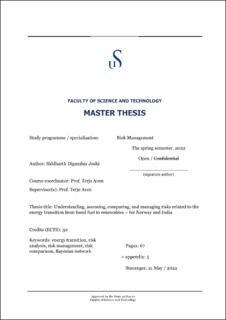| dc.description.abstract | There is growing worry about the future supply of fossil-fuel-based energy and its environmental consequences. There is call for the globe to switch from fossil fuels to renewable energy sources. (Teles et al., 2015). On the other hand, the speed and scale of this shift remain uncertain and arguable. (Gribkova & Milshina, 2022). The energy transition is inherently risky. (Poudineh et al., 2019). The main objectives of the thesis are to gain improved knowledge of the risks related to the energy transition from fossil fuel to renewables for Norway and India, and contribute to improve the assessment and management of these risks. The energy industry is responsible for nearly three-quarters of the emissions that have already increased world average temperatures by 1.1 degrees Celsius since pre-industrial times, with evident effects on weather and climate extremes. The energy industry must be at the center of the climate change solution. (IEA, 2021b). The thesis performs risk analysis for both nations using Bayesian network, compares and demonstrates the variations in the study's outcomes, as well as the different risk management approaches that they may use. The Bayesian network events and consequences are interlinked, and the sequence of action may or may not be followed as demonstrated as it depends on the various factors and the probability of occurrences of scenarios involving these factors. Factors such as government policies encouraging renewable energy and energy efficiency, technology and innovation, people expectations, Covid-19 will all play a role in the sequence. The thesis further shows that socioeconomic factors influence the risks and the energy transition for both the countries. Risk comparison demonstrates that a same risk problem in two distinct situations (here, two separate nations) is not identical. The risk comparison underlines the importance of conducting a context assessment first in order to have a better understanding of risk. Risk management strategies are suggested in this thesis for the management of risks for Norway and India which contributes to improved risk management of the energy transition risks for Norway and India. Risk informed strategy is used in the thesis wherein risk treatment methods are suggested for the identified risk sources and initiating events. When one wants to choose between several solution alternatives for the energy transition problem then the author suggests that a multi-attribute analysis is a better approach for decision making because there are several factors influencing the decision-making process, including energy sources, energy demands, population, economy, geography, political goals and strategies, ethical factors, social factors, personal factors, infrastructure needs, citizen psychology, societal preference, speed of transition, and in general its magnitude. The author believes that the governments must try to strike a balance between the various attributes. These questions have no definitive solutions. The author of this thesis emphasizes that whether precautionary principle be given more or less weight is the choice of the decision maker. Companies should propose alternative uses of oil and gas utilities to successfully tackle the energy transition barrier and enhance the degree of risk acceptability and tolerance in the energy market. For productive operations, organizations should take effective precautions and adopt contemporary risk acceptability models such as ALARP. By performing risk analysis and comparing the risks these countries face in achieving the Paris Climate Agreement and the Sustainable Development Goals using various risk management strategies, this thesis contributes to a better understanding of the energy transition risks and improved risk assessment & risk management for Norway and India. | |
